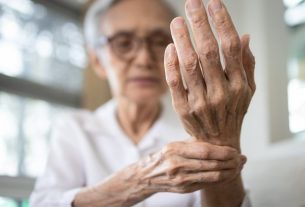Rheumatoid arthritis is a chronic autoimmune inflammatory disease that affects the joints, causing symptoms such as pain or swelling, stiffness in the morning or difficulty moving the affected joint.
This disease mainly affects women aged 35 to 50, but it can also affect men, and occurs at any age, including children, in which case it is known as juvenile rheumatoid arthritis.
Read too: Juvenile arthritis: symptoms, causes, types and treatment
The treatment of rheumatoid arthritis is carried out by a rheumatologist who may recommend the use of anti-inflammatory or immunosuppressive medications, dietary changes or physiotherapy, to alleviate symptoms, prevent the disease from progressing and improve quality of life.
Sensitive content
This image may contain content that is uncomfortable for some people.

Rheumatoid arthritis symptoms
The main symptoms of rheumatoid arthritis are:
- Pain and swelling in the joints, with a slow onset lasting weeks to months;
- Stiffness in the affected joint, especially in the morning;
- Deformity of the fingers or neck;
- Difficulty moving the affected joint;
- Presence of lumps in the joint;
- Low fever;
- Excessive tiredness or general malaise.
Symptoms of rheumatoid arthritis usually start slowly, over weeks to months, affecting small joints mainly in the hands or feet, followed by larger joints, such as knees, shoulders, hips or the cervical spine, for example.
These symptoms slowly worsen and in more advanced stages of the disease, there may also be a decrease in strength and range of movement. See other symptoms of rheumatoid arthritis.
In addition to the joints, rheumatoid arthritis can also affect the blood vessels, lungs or eyes, and cause vasculitis, interstitial lung disease or Sjögren’s syndrome.
Rheumatoid Arthritis Symptoms Online Test
If you think you may have rheumatoid arthritis, check the symptoms in the test below:
The test is only a guidance tool, not serving as a diagnosis nor replacing a consultation with a rheumatologist or orthopedist.
How to confirm the diagnosis
The diagnosis of rheumatoid arthritis is made by a rheumatologist or orthopedist by evaluating the symptoms, when they started, health history and physical examination of the affected joints.
Make an appointment with a rheumatologist in the region closest to you:
Taking care of your health has never been easier!
In addition, the doctor must carry out a physical examination of the affected joints in which decreased grip strength, deviations or deformities in the joint or reduced range of movement can be observed, for example.
Tests for rheumatoid arthritis
The tests for rheumatoid arthritis that may be recommended by your doctor are:
- X-ray or MRI, to evaluate the affected joints;
- Complete blood count;
- C-reactive protein (CRP);
- Erythrocyte sedimentation rate (ESR);
- Anti-cyclic citrullinated peptide (anti-CCP) antibodies;
- Antinuclear antibodies.
Another test is the rheumatoid factor (RF), which may be increased, but in other health conditions, such as lupus or chronic infections, there may also be an increase in RF.
Read too: Rheumatoid factor: what it is, how it is done and how to understand the result
Therefore, the doctor must evaluate the rheumatoid factor, along with other tests to confirm the diagnosis of rheumatoid arthritis and rule out other diseases with similar symptoms, such as osteoarthritis, lupus or polymyalgia rheumatica, for example.
Is rheumatoid arthritis curable?
There is no cure for rheumatoid arthritis, however, the worsening and progression of the disease can be prevented with treatments recommended by your doctor.
Possible causes
Rheumatoid arthritis is caused by a combination of genetic and environmental factors, causing immune system cells to attack the joints, as if they were foreign to the body, resulting in symptoms.
The main factors that can increase the risk of rheumatoid arthritis are:
- Age, being most common from 35 to 50 years old;
- Gender, mainly affecting women;
- Family history of rheumatoid arthritis;
- Smoking habit;
- Obesity or overweight;
- Exposure to silica, asbestos or textile dust;
- Virus or bacterial infections;
- Inflammation of the gums, called gingivitis.
Additionally, changes in intestinal function and flora, called dysbiosis, also appear to increase the risk of rheumatoid arthritis.
Read too: Intestinal dysbiosis: what it is, symptoms, causes and treatment
How the treatment is carried out
The treatment of rheumatoid arthritis must be carried out under the guidance of a rheumatologist or orthopedist, with the aim of preventing the disease from progressing and worsening symptoms, and improving quality of life.
Thus, the main treatments for rheumatoid arthritis are:
1. Anti-inflammatories
Non-steroidal anti-inflammatory drugs may be prescribed by your doctor to help relieve symptoms of joint pain and inflammation.
Some examples of non-steroidal anti-inflammatory drugs are ibuprofen, piroxicam, meloxicam, naproxen or celecoxib.
These remedies should only be used with the advice of a rheumatologist or orthopedist, as they may be contraindicated in cases of cardiovascular disease, or kidney or liver disease.
2. Corticosteroids
Corticosteroids, such as prednisone or prednisolone, may be recommended by the doctor in cases of very active rheumatoid arthritis, in the transition phase of treatment to disease-modifying drugs (DMARD).
Additionally, the doctor may apply corticosteroids to the affected joint to relieve pain and inflammation.
3. Disease-modifying medications
Disease-modifying drugs (DMARDs) help reduce the activity of rheumatoid arthritis and prevent the disease from progressing.
The main medications that modify the course of the disease that may be recommended by your doctor are:
- Immunosuppressantssuch as hydroxychloroquine, chloroquine, methotrexate, azathioprine, sulfasalazine or leflunomide;
- Tumor necrosis factor inhibitors (anti-TNF)como etanercept, infliximabe, adalimumabe, certolizumabe e golimumabe;
- Biological therapysuch as rituximab;
- Inhibitors of T cell activationsuch as abatacept;
- Interleukin C inhibitorscomo tocilizumabe;
- Janus kinase inhibitorssuch as tofacitinib.
These remedies should be used with the advice of a rheumatologist or orthopedist and with regular consultations and exams to assess the effectiveness of the treatment and the emergence of side effects.
4. Exercises for rheumatoid arthritis
Exercises for rheumatoid arthritis are indicated to help strengthen the muscles around the joint and improve joint mobility. See how to do exercises for rheumatoid arthritis.
In addition, your doctor may recommend low-impact exercises, such as swimming or water aerobics, for example.
5. Physiotherapy
Physiotherapy for rheumatoid arthritis is a very important treatment to help alleviate symptoms, prevent joint deformity and improve quality of life.
This type of treatment must be carried out with the guidance of a physiotherapist, with stretching and muscle strengthening exercises, joint mobilization or even the use of warm compresses or electrical stimulation, for example.
6. Anti-inflammatory diet
Since rheumatoid arthritis is a chronic inflammatory disease, your doctor may recommend an anti-inflammatory diet, which should be done in accordance with the nutritionist’s advice.
Therefore, preference should be given to foods such as turmeric, broccoli or spinach, and foods rich in omega-3, such as tuna, sardines, salmon, flaxseed or chia, can help reduce joint inflammation.
These foods should be consumed daily or, in the case of fish, at least 3 to 5 times a week. Find out what the diet for rheumatoid arthritis should be like.
7. Surgery
Surgery may be recommended by your doctor to help restore mobility to the joint and relieve symptoms when other treatment options have not been effective.
Therefore, surgery may be recommended to remove the synovial membrane, stabilize the joint or remove the joint and replace it with a prosthesis, for example. Learn more about treating rheumatoid arthritis.
Natural treatment option
Natural treatment for rheumatoid arthritis can be done with the consumption of teas such as ginger tea or turmeric tea, or ointments such as arnica, for example, as they have anti-inflammatory action that can help reduce joint inflammation.
Teas for rheumatoid arthritis do not replace treatment recommended by a rheumatologist or orthopedist, but can be used to complement medical treatment. Learn how to prepare home remedies for rheumatoid arthritis.
Possible complications
Rheumatoid arthritis can cause complications in several organs, in addition to the joints, such as anemia, Sjögren’s syndrome, pleuritis, bronchiolitis, interstitial lung disease, pericarditis, inflammation in the blood vessels or coronary artery disease.
Furthermore, other complications are osteoporosis, rupture of ligaments or tendons or frequent infections.
Complications from rheumatoid arthritis can occur mainly when treatment is not carried out correctly, according to the doctor’s instructions.
What makes rheumatoid arthritis worse?
Rheumatoid arthritis can be worsened by smoking, in addition to being overweight, for example.
Therefore, it is recommended to stop smoking and go on a diet to lose weight, in cases of obesity or overweight, maintaining a healthy, nutritious and balanced diet to promote weight loss. Learn how to have a healthy diet.
Furthermore, not correctly following the treatment recommended by your doctor, whether with medication, physiotherapy, diet or surgery, can also worsen rheumatoid arthritis.

Sign up for our newsletter and stay up to date with exclusive news
that can transform your routine!
Warning: Undefined array key "title" in /home/storelat/public_html/wp-content/plugins/link-whisper-premium/templates/frontend/related-posts.php on line 12
Warning: Undefined array key "title_tag" in /home/storelat/public_html/wp-content/plugins/link-whisper-premium/templates/frontend/related-posts.php on line 13




